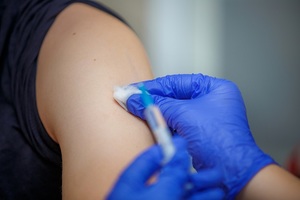JCVI issues advice on COVID-19 booster vaccines for those aged 40 to 49 and second doses for 16 to 17 year olds
JCVI has advised that, in addition to those aged over 50 years and at higher risk from coronavirus, all adults aged 40 to 49 years should be offered an mRNA booster.

The Joint Committee on Vaccination and Immunisation (JCVI) has advised that, in addition to those aged over 50 years and at higher risk from coronavirus (COVID-19), all adults aged 40 to 49 years should be offered an mRNA booster, 6 months after their second dose, irrespective of the vaccines given for the first and second doses.
Recent UK and international data have provided early signs of a slight fall in the levels of protection against severe disease from the primary doses, in those who had their initial vaccines a long time ago. Booster vaccines are being offered to eligible groups to help them maintain high levels of protection against hospitalisation, severe illness or dying over the winter.
The vast majority of the UK adult population has received a COVID-19 vaccine since the programme was launched in December 2020 – including 87.9% of the population who have received a first dose and 80% who have received 2 doses.
JCVI has previously advised booster vaccination for all adults aged 50 years and over and those in a COVID-19 at-risk group. The offer has now been broadened to include those aged 40 to 49 years.
Booster vaccination should be with either the Pfizer-BioNTech vaccine, or the Moderna vaccine, as previously advised. Both of these vaccines are expected to give a good level of extra protection.
The advice comes as the UK Health Security Agency (UKHSA) publishes the first data on booster vaccine effectiveness in the UK. The analysis shows that people who take up the offer of a booster vaccine increase their protection against symptomatic COVID-19 infection to over 90%. Protection against more severe disease is expected to be even higher.
Following 2 doses of the vaccine – as yet – there is no robust evidence of a decline in protection against severe COVID-19 (hospitalisation and deaths) in those aged under 40. JCVI will continue to closely review all available data to develop further advice in due course.
JCVI issues advice on second doses for 16 to 17 year olds
The JCVI is advising that all 16 to 17 year olds who are not in an at-risk group should be offered a second dose of the Pfizer vaccine. The second vaccine dose should be given 12 weeks or more following the first vaccine dose.
For those in this age group who have had COVID-19 infection, the second vaccine dose should be given 12 weeks or more following the first vaccine dose, or 12 weeks following a positive COVID-19 test result – whichever is later.
This advice is in addition to the existing offer of 2 doses of vaccine to 16 to 17 year olds who are in ‘at-risk’ groups, as described in the Green Book.
The decision to advise the second dose is based on a review of the latest evidence of the benefits of the vaccine programme, compared to the risks of any side effects. A second vaccine dose increases the level of protection and is important for extending the duration of protection. As protection from the first dose will eventually start to decline, the benefits from the second vaccine dose will become more important over time. A second dose may also offer a reduction in the risk of hospitalisation and onward transmission to vulnerable close contacts.
In reports originating from outside the UK, extremely rare adverse reactions, such as myocarditis (inflammation of the heart) have been reported more frequently after the second vaccine dose compared to the first vaccine dose. However, in countries such as Canada and the UK, who have a longer interval between the first and second doses, rates following the second vaccine dose are closer to the reporting rate after the first dose.
The latest available data indicate that myocarditis following vaccination usually resolves within a short time, most cases respond well to treatment and where information is available, no major complications have been identified in the medium term (months).
Taking these factors into consideration, JCVI has concluded that the balance of risks and benefits supports offering a second dose of the Pfizer-BioNTech COVID-19 vaccine in persons aged 16 to 17 years who are not in an at-risk group.
Professor Wei Shen Lim, Chair, COVID-19 immunisation, JCVI said:
Booster vaccine doses in more vulnerable adults, and second vaccine doses in 16 to 17 year olds are important ways to increase our protection against COVID-19 infection and severe disease. These vaccinations will also help extend our protection into 2022.
If you are eligible, please make sure to have these vaccines and keep yourselves protected as we head into winter.
UK Health Security Agency press office
10 South Colonnade
London
E14 4PU